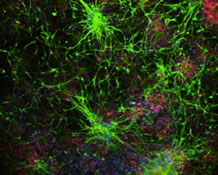Columbia University
Irving Medical Center
Neurological Institute
710 West 168th Street, 3rd floor
(212) 305-1818
About Us
Taub Faculty
Alzheimer’s disease (AD) patients progressively lose neurons yet cannot form new replacement cells in part due to the dramatically reduced neurogenic capacity. This suggests that the defects in the formation of new neurons could be one of the contributing factors to AD pathogenesis. By employing endogenous neural stem cells or neural progenitors, tissue loss could be counteracted, and the integrity of the existing tissues could be enhanced. Thus, neurogenesis relates to the resilience to neurodegeneration. However, the mechanism of how neuro-regeneration could be induced on demand, how AD pathogenesis alters the neurogenic cell populations, and the complex cellular crosstalk for resilience mechanisms are unknown.
By using zebrafish as a model organism, we are interested in uncovering the molecular basis of neural regeneration and enhanced functional integration of neurons in AD. Our research group aims to understand the molecular mechanisms that zebrafish brain uses to induce regenerative stem cell plasticity and neurogenesis, use zebrafish as a mechanistic tool to investigate the molecular and cellular functions of the clinically identified genes related to AD pathology in humans, translate the protective modalities of the zebrafish brain to in vivo and in vitro mammalian AD models, and perform chemical screens in pre-clinical zebrafish AD models we generated. With the help of our toolkit for multi-omics approaches, gene editing, in vitro bio-instructive cell culture models, histological approaches, behavioral measurement, electrophysiological modalities, and clinical data-driven model development, our long-term perspective is to determine novel cellular mechanisms of AD pathogenesis for identifying new biological targets for disease-modifying interventions and drug development.


